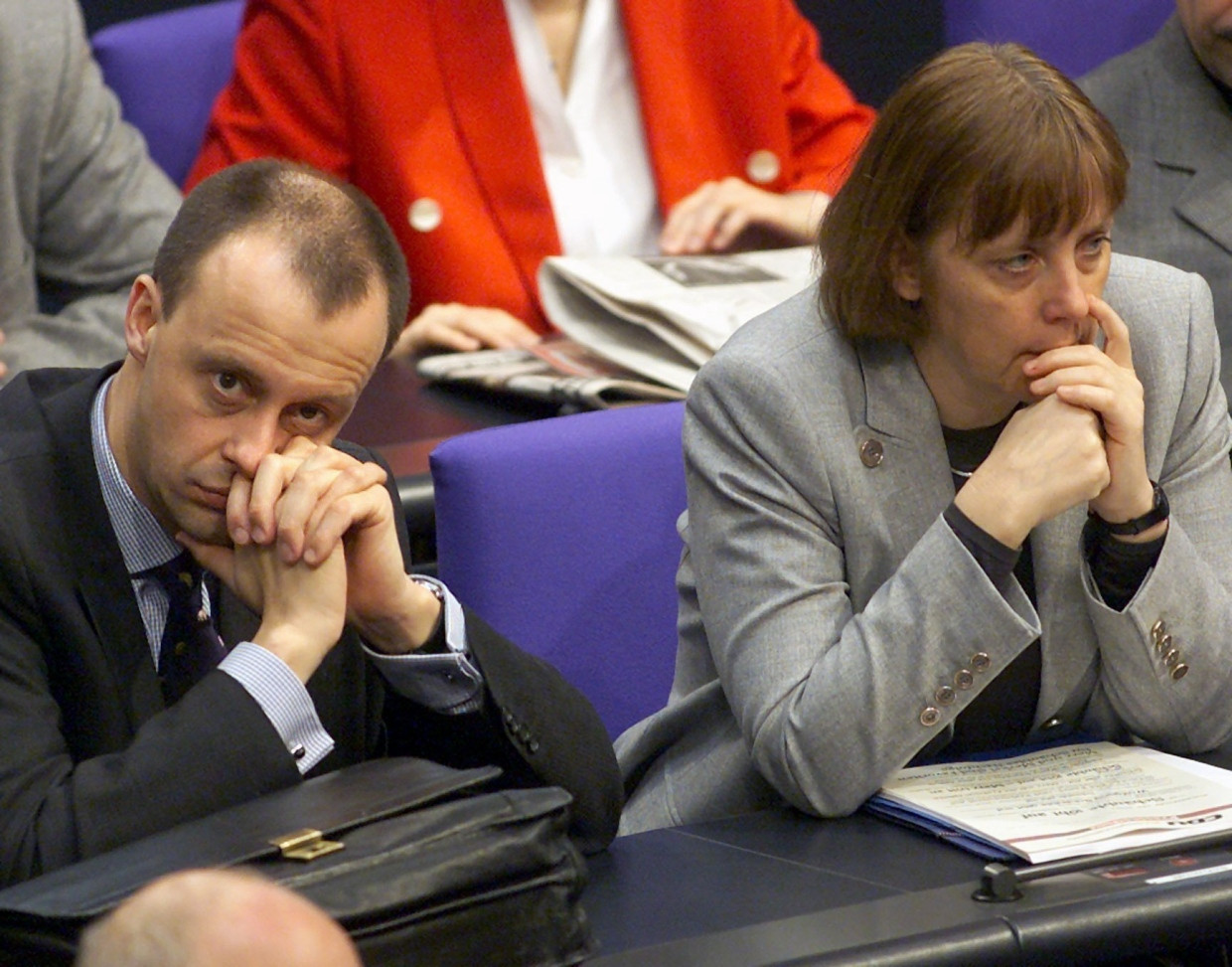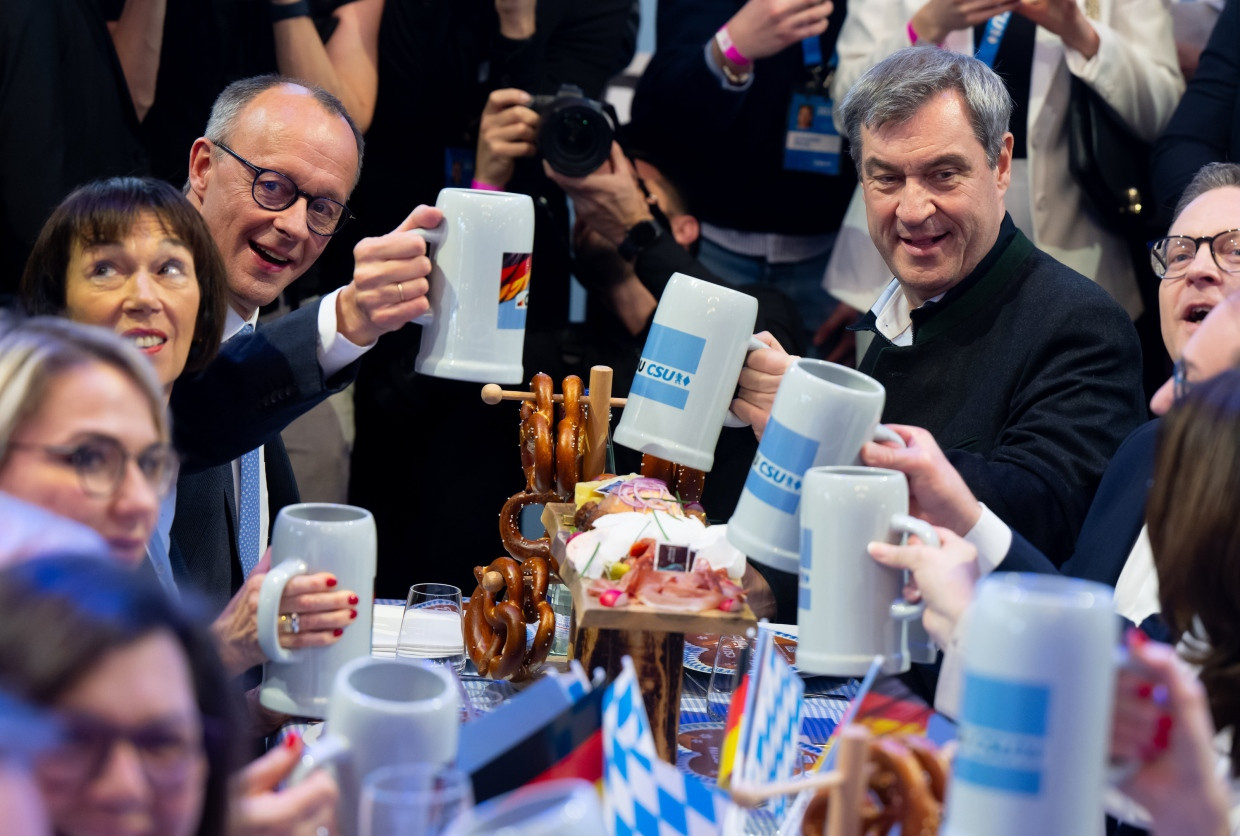Es ist ein bemerkenswerter Zeitpunkt, zu dem im Konrad-Adenauer-Haus am Sonntagabend besonders kräftiger Jubel aufkommt: als der Moderator auf dem Großbildschirm verkündet, die Wahlbeteiligung habe bei 84 Prozent gelegen. Es ist wie ein Befreiungsmoment, zu dem die christdemokratische Gemeinde hemmungslos jubeln darf. Denn was der Moderator vorher verkündet hat, ist die Hängepartie, die den Abend prägt. Die CDU muss hoffen, dass der frühere Dauer-Regierungspartner FDP es nicht wieder ins Parlament schafft, damit man selbst bessere Chancen hat, mit nur einer Partei – der SPD – eine Regierung zu bilden.
Doch es dauert nicht lange, und die Christdemokraten im Foyer der Parteizentrale und auf den Balkonen ringsum fangen wieder an zu jubeln: Kanzlerkandidat Friedrich Merz ist um 18.35 Uhr auf die Bühne gekommen und fasst die Ereignisse prägnant zusammen: „Wir haben die Bundestagswahl gewonnen.“ Sofort schiebt er den für ihn offenbar ersten Grund hinterher: Weil CDU und CSU gut zusammengearbeitet hätten.
Zur Rechten von Merz steht Markus Söder auf der Bühne, der CSU-Vorsitzende und bayerische Ministerpräsident. Merz dankt Söder. Kurz darauf dankt Söder Merz. Im Namen der CSU überbringt er Glückwünsche. Die Welt sei in Unordnung, nun müsse wieder Ordnung geschaffen werden. Die Menschen trauten das einer Partei und einem Mann zu: Friedrich Merz. Vom Bildschirm erklingt kurz darauf die Stimme von Kanzler Olaf Scholz. Er gratuliert zum Sieg. Merz weiß, dass die Kanzlerschaft in greifbarer Nähe ist. In welcher Koalition? Das ist die Frage, die noch eine Weile offen bleibt. Deswegen ist die Freude im Adenauer-Haus trotz des Sieges zunächst gedämpft.
Die Union hatte sich ein besseres Ergebnis erhofft. Ersten Hochrechnungen zufolge lag sie unter 30 Prozent. Damit hatten CDU und CSU jedoch besser abgeschnitten als die SPD in der Wahl 2021; sie erlangte damals 25,7 Prozent.
Aus welchem Holz ist Merz geschnitzt?
Eine Wahl dürfte Friedrich Merz aber sicher sein. Selbst wenn CDU- oder CSU-Politiker am Ergebnis der Union bei der Bundestagswahl herummäkeln sollten, dürften sich die Ereignisse des Jahres 2002 nicht wiederholen. Damals war Merz auch als Fraktionsvorsitzender in die Bundestagswahl gegangen. Kaum war diese vorüber, ließ sich eine gewisse Angela Merkel gegen den Willen des bisherigen Amtsinhabers zur Chefin der Abgeordneten von CDU und CSU wählen. Dieses Mal ist niemand zu erkennen, der Merz die Wiederwahl als Fraktionschef am Dienstag streitig machen wollte.
Die Frage nach der Bundestagwahl lautet nun: Ist Merz aus Kanzlerholz geschnitzt? Hat er genug Kampfeswillen und Durchhaltevermögen, um nicht nur ganz nach oben zu kommen, sondern sich dort auf Dauer zu behaupten? Nachdem Merkel und der CSU-Vorsitzende Edmund Stoiber beschlossen hatten, einen gemeinsamen Vorschlag für den Vorsitz der Unionsfraktion zu machen, und dieser Vorschlag Merkel hieß, war für lange Zeit das Licht ausgegangen über der politischen Karriere von Joachim-Friedrich Martin Josef Merz, geboren am 11. November 1955 in Brilon im östlichen Sauerland.
Merkel schüttelte den sehr knappen Wahlausgang rasch aus dem Blazer und fasste so erfolgreich Fuß im neuen Amt, dass Platz eins in der CDU und in der Union auf nicht absehbare Zeit besetzt war

Merz remained a member of the German Bundestag until 2009, drew attention to himself through suggestions such as the one for a tax return that fits a beer lid. But already in 2004 he withdrew from the deputy parliamentary group chair. Soon afterwards he worked as a lawyer. Not only with the departure from parliament, but especially afterwards he took over the supervisory board mandate, including the American asset manager Blackrock in Germany. Unlike his friend and mentor Wolfgang Schäuble, who continued to keep through after the attack, bursting chancellor dreams and the end of the hope of being able to move into the Bellevue Castle in the political battle arena, Merz withdrew from this.
What remained was the longing of his followers in and outside the CDU, for which Merz became the epitome of a conservative CDU, which they gradually disappeared under the leadership of Merkel. But for many years they had to comfort themselves with occasional interview expressions. For example, when Merkel did not make a tax reform on the beer lid in 2011 after the reactor accident in Fukushima, but made a U -turn in nuclear policy, and Merz criticized this with the words of the CDU. It turned, but didn't break. It remained silent about Friedrich Merz.
His return to the big political stage in October 2018 also raised questions about his will to fight. Because he had only thrown his hat into the ring at the moment when Merkel announced not to run for the CDU chair again and not to start again as a candidate for chancellor. So he did not challenge her, but waited until she went before he started fighting for her successor at the age of 63 at the age of 63.
Merz cannot be denied determination
Since then, the determination cannot be denied. Twice he tried in vain for the CDU chair. In the third attempt, it was elected in early 2022. It could have the impression that the CDU only had the courage to vote Merz to its chairman when the queen had really climbed off the throne and the Chancellery had handed over to Olaf Scholz. The first hurdle was taken.
He was able to wipe out the notes of Merkel, which was created twenty years earlier, by taking away the post of the boss of the MPs to his North Rhine-Westphalian party friend Ralph Brinkhaus without much fuss, which he was against the express will of the already weakened Chancellor had won. It was the second and fastest step in the start of the big goal. The next, until then the most difficult, took more time.

It was only when the Bavarian Prime Minister and CSU chairman Markus Söder not only understood with his head, but also with his stomach that he would not be able to get the Union as a candidate for chancellor in this Bundestag election was the way for Merz. His biographer Volker Resing recalls how the then group leader in 2002, when Merkel tried in vain, brought into play as a candidate for chancellor. He didn't have chances. He was only ridiculating from the CSU: “I am surprised by the physical phenomenon that for the first time in world history the echo comes before the reputation,” commented CSU General Secretary Thomas Goppel at the time.
So now it could be so far. Although it has already happened in the history of the Federal Republic, the candidate with the best result did not become head of government like Helmut Kohl 1976. But that's the big exception. Friedrich Merz has good prospects of being Chancellor in a few months. Thorsten Frei, Parliamentary Managing Director of the Union Group and one of those who controlled the election campaign in the closest circle around Merz, went one step further and said shortly before the election day in Futur I: “There will be a chancellor that will be called Friedrich Merz.”
Before that – see above – he is confirmed as the group leader. On Monday after the election, the party leadership committees first come together and talk about the election result. On Tuesday, the members of the parliamentary group meet from the ending legislative period. Then the group of parliamentary group is renewed by the CDU and CSU. Subsequently, Merz as parliamentary group leader and Alexander Dobrindt as chairman of the CSU state group are to be re-elected by the members of the new faction.
Merz will have to form a coalition
If Merz succeeds in forming a coalition, he will therefore have head of government, and the MPs have to look out a new chairman. Since Dobrindt would get a ministerial post in a cabinet of Merz, a new state group leader would also have to be found.
The dream of individual optimists in the CDU, if the small parties did not make it into the Bundestag, there would be a minimal chance of an absolute majority, was always a dream and remained. Merz will have to form a coalition. He benefited from the fall of the traffic light under Olaf Scholz because a new Bundestag was previously elected as planned. But the erosion of the triangle of three for the Union was a reminder to form the most stable alliance. Will he succeed in this journeyman before becoming a master?
The skeptical indication of a lack of experience – Merz has never ruled – has lost a little bit of strength with every day of decaying the traffic light. Because it was precisely that Scholz brought with him: long government experience in the federal and state governments. However, he could not prevent the end of his alliance.
The new adjustment of Germany's role in Europe as a task
In terms of content, the next government must first take care of the new adjustment of Germany's role in Europe in a dramatically changing transatlantic structure, and that at the turning point of the war of the Nuclear Nuclear Russia against Ukraine. Immediately before the election day, Merz had confirmed that Germany had to become a leadership in Europe than before. He was not – a sentence that Scholz stumbled several times – he was not so careless to say who ordered guided tours. However, the message is similar.
The next chancellor has to clarify quickly how Europe and Germany negotiate with the securing of a possible peace in Ukraine, America and Russia alone. Merz has international experience through his time in the European Parliament and his many years of professional connection with the United States. He also has experience with economic and financial issues, although he never managed a large company. That would be the second field for him, on which a new course Hermuss rapidly in the face of an economically weakening Germany.
To calm the political debate and to demonstrate to demonstrate his own credibility, he must above all have to do something to further reduce the influx of migrants to Germany. How good he can do with a left -wing partner, be it the SPD, be it the Greens or even both, will be shown. A few days before the election, when he collected one of his five demands to tighten the migration policy, to which the AfD had helped a majority in the Bundestag, recently and sound without a sound in a television debate, the SPD was pleased with this turn.
On the other hand, when he announced at the CDU and CSU election campaign in Munich that there was no left -wing politics in Germany, and that combined with the announcement that he wanted to make politics for those who “still have all cups in the closet”, leading social democrats reacted annoyed. The SPD chairman Lars Klingbeil accused Merz to make the “trenches in the democratic middle” on the last meters of the election campaign. The SPD parliamentary group leader Rolf Mützenich called Merz a “mini-trump”. In any case, government formation should not be easy.








